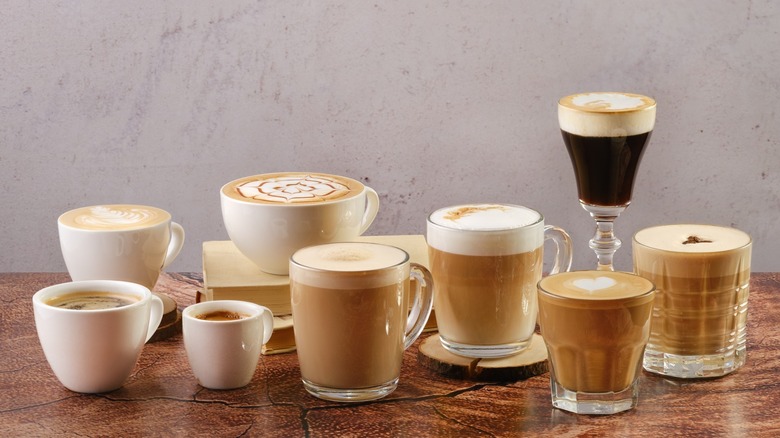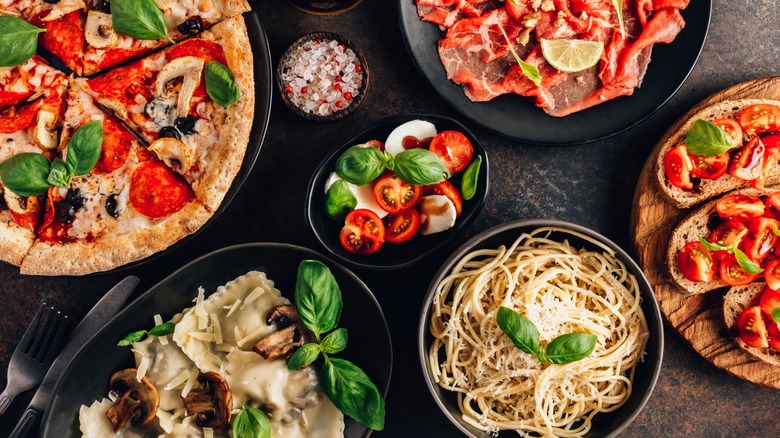Why An Afternoon Cappuccino Is Frowned Upon In Italy
The cappuccino, a beautiful blend of strong espresso and rich, foamy steamed milk, holds a timeless and enjoyable quality, making it a lovely drink wherever and whenever you might have one, right? However, if you were in Italy, you might receive a strange look or perhaps a raised eyebrow if you ordered one after breakfast. This isn't necessarily judgmental, and it might not be because you're a tourist (although this order would almost certainly reveal that). Instead, it's more about concern for how the drink will affect the rest of your day.
Italians take their coffee culture very seriously. Beyond favoring espresso over coffee, and eschewing the idea of taking coffee to-go, Italian culture has developed some rules about their caffeine consumption that may go unnoticed by outsiders. One of these rules is that one should not order a cappuccino after breakfast, and certainly no later than noon. The reason you won't see any self-respecting Italian ordering a cappuccino past this time is that the amount of milk in a cappuccino is believed to hinder digestion, so having one with an evening meal would be quite counterproductive (not to mention unsettling for your stomach). While this piece of knowledge is interesting, it opens up a whole realm of Italian cuisine, and explains why they have such a regimented food and beverage culture.
Different beverages for different times
Generally speaking, Italians view dairy as something that slows down digestion and lingers in the stomach. This perspective makes cappuccinos particularly appealing in the morning, when Italians typically enjoy only a light breakfast alongside their caffeinated beverage. The milk in a cappuccino mitigates the strong acidity of drinking espresso on an empty stomach, and provides a bit of extra energy from its fat content. While this is beneficial for a morning drink, it's not considered desirable in the afternoon and evening, when larger, more substantial meals are common. Instead, you might opt for a macchiato, which contains considerably less milk, or, if you're visiting in the summer, a delightful shakerato — Italy's take on iced coffee.
Alternatively, you could forego coffee entirely at this time, as coffee isn't the only beverage governed by these digestive rules. Italy offers an array of drinks, usually alcoholic, to be enjoyed as either an aperitivo or digestivo, meaning they're consumed before a meal to stimulate appetite or after a meal to aid digestion, respectively. These range from bitter liqueurs like Aperol or Campari to herbal tinctures like Amaro Montenegro, and sweet options such as the renowned Italian limoncello. Of course, espresso remains a viable choice — be it a ristretto or a long shot — just steer clear of ordering a cappuccino.
The rules of engagement for Italian cuisine
This "rule" regarding cappuccino consumption may appear arbitrary at first, but delving into the digestif culture in Italy uncovers a well-honed system aimed at optimizing the dining experience. This informal system has been refined over generations to provide the best culinary journey possible. However, it's not just beverages that are governed by these rules of Italian dining. There are numerous other guidelines on how to maximize the enjoyment and benefits of food.
For instance, were you aware that in Italy, it's not customary to butter your bread? Indeed, many Italians use their table bread not as a snack, but as a tool to mop up any remaining sauce on their plates. Additionally, you might notice that Italians often serve meals in the evening in a staggered fashion, rather than as a single large course. The sequence of antipasti (appetizers), meat, pasta, vegetables, and dessert might not be strictly followed at every meal, but there's a deliberate adherence to this preset order. And would it be surprising to learn that this, too, is linked to cultural beliefs about proper digestion? While these rules might seem limiting, they are revered traditions that ensure each meal and beverage consumed in Italy is all the more satisfying.


